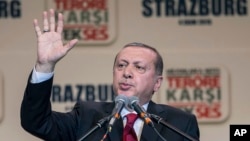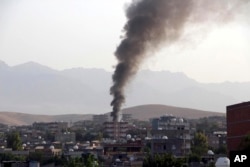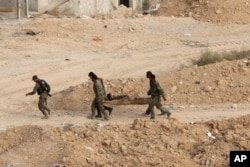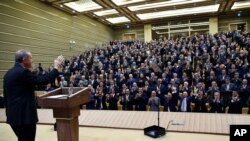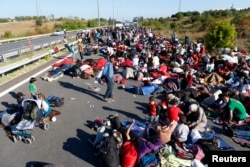After pulling off a surprise electoral victory, President Recep Tayyip Erdoğan and members of his Justice and Development Party (AKP) are indicating they will pursue policies likely to complicate the West’s fight against the Islamic State terror group and roil Ankara’s relations with Europe.
The most complicated issue for the West will remain centered on the AKP government’s determination to seek a military solution rather than a political one when it comes to the outlawed Kurdistan Workers’ Party (PKK).
The PKK's Syrian offshoot is a crucial ally for the West against Islamic State militants across the border from Turkey.
The collapse of peace process between Ankara and Kurdish rebels triggered Turkish airstrikes on PKK bases in southeast Turkey and the Quandil Mountains of northern Iraq, and increased PKK terrorist attacks across the country.
Scores of security officers and civilians have been killed or wounded in the airstrikes and attacks. Both sides blame each other for the breakdown of the talks.
Prime Minister Ahmet Davutoğlu indicated midweek the government isn’t thinking of any let-up in military operations against the PKK and ordered a continuation “without interruption in winter conditions,” according to a statement issued after meeting with national security advisers.
And in a speech this week, President Erdoğan said the fight against the PKK would be intensified until the group is defeated for good.
“They say that 2,000 Kurdish people have been killed by the state. Excuse me, you have to learn that this state never shoots at a Kurdish citizen, this state shoots at terrorists," he declared.
Washington, Kurdish fighters
His speech also targeted municipal authorities in Kurdish-controlled areas for abetting the PKK, suggesting Ankara may unleash a wave of arrests and prosecutions of elected officials from the pro-Kurdish Peoples’ Democratic Party, or HDP.
Such a move would likely trigger more angst for a European Union already critical of Ankara’s crackdown on media outlets opposed to Erdoğan.
Turkish officials emphasized this week their determination to ensure the PKK’s Syrian affiliate, the Democratic Union Party (PYD), isn’t strengthened by any Western support or movements west of the Euphrates River to expand territory it controls along the border with Turkey.
On Thursday, the Foreign Ministry said Ankara intends to “follow up” on recent U.S. assurances that it will not provide weapons or ammunition to Syrian Kurds.
The PYD forces, known as the People’s Protection Units (YPG), are seen by Washington as their most capable allies on the ground against Islamic State extremists, having pulled off a string of victories in the past few months.
Pentagon officials have said an October air-drop of small arms in northeastern Syria was received only by Arab fighters allied with Syrian Kurdish forces. But controversy surrounds the resupply, with Arab rebel commanders admitting recently to VOA the weaponry is being shared with YPG allies.
Washington has struggled to reconcile differences between Ankara and the YPG.
One official testified in the U.S. Senate panel that maintaining support for the YPG in Syria while cooperating with Ankara is one of the most complex challenges facing Washington.
Erdoğan and the West
One of the big overarching questions about how the AKP’s reelection will impact Turkey’s foreign policy rests with Erdoğan and whether he will tone down his habitually abrasive anti-Western rhetoric.
Within hours of the AKP’s victory in Sunday’s parliamentary polls, he appeared to answer that question, urging his countrymen to stay united in the face of supposedly “great plots” being hatched against the Turks by outside powers.
The president didn’t outline the plots, or name the conspirators, but his supporters in pro-government media have been less reticent in pointing to Western powers, reserving more of their venom for the U.S. and European governments than the Islamic State terror group, which has carried out a string of recent bombings on Turkish soil.
“The West tried to label Erdoğan a dictator and give the impression that the AK Party was on the way out,” according to Daily Sabah columnist İlnur Çevik. “Yet the Turkish people gave the appropriate answer on Sunday. The post-modern war of liberation was won by the Turkish people, the losers were the West and its tools in Turkey.”
Difficult road ahead
Aykan Erdemir, a former Turkish lawmaker and now a senior fellow at the Foundation for the Defense of Democracies, a Washington policy research group, fears the road ahead is likely to become more difficult when it comes to Turkish-West relations than in the previous 13 years of AKP rule.
“Under four years of single-party rule by the AKP, Turkey could drift further from the European Union and NATO, strengthening the rise of illiberalism and authoritarianism within the transatlantic alliance,” Erdemir warns.
And that could force governments in the United States and European Union to accept Turkish foreign and domestic policies they don’t like because of the need for Ankara’s support in the fight against the Islamic State – the West’s highest priority, and greater Turkish assistance in curbing the flood of Syrian refugees to Europe from Turkey.
Erdoğan will have his first chance to chance to present his new positions to the U.S. and E.U. at the annual summit of the G20 being held in Antalya on November 15-16.
The Syrian civil war and the refugee crisis are expected to be high on the agenda.
IS, refugees
U.S. officials say they will be pressing Turkey to mount more military actions against the Islamic State – Turkish warplanes conducted raids against IS militants just north of Aleppo this week.
And E.U. leaders will push for more efforts to stop Syrian refugees leaving Turkey for Europe and for Turkey to admit illegal migrants sent back from EU countries.
Ankara’s immediate price is expected to be a demand for more liberal EU visa rules for Turks wanting to visit Europe.
Turkish officials say promises won’t suffice. Neither, they say, will European criticism of Turkey’s civil rights record be acceptable.




